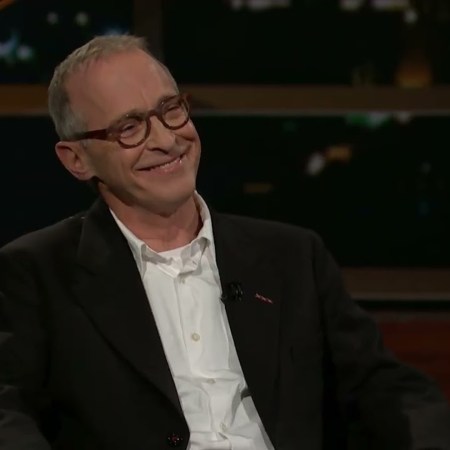There’s a long and vibrant tradition of comedians addressing politics as a way to expose the flaws of the powerful and reveal the absurdity of the everyday. Most weeks on Real Time With Bill Maher, the news is more than enough to give Maher and his writing staff plenty to tackle. This week, though, was bleaker than most — including an alarming U.N. report on climate change and the Taliban taking over more and more of Afghanistan. What do you do when there’s little in the news suited for a punchline? Based on this episode’s opening monologue, the answer appears to be “Riff on Hunter Biden.”
There were other jokes to be made — including a few about Barack Obama’s recent birthday celebration — but, by and large, the jokes this time out had a bleaker undercurrent to them. Maher brought the segment to a close with a few riffs on the recent census data — including a bit about Cracker Barrel changing its name to “Barrel” — before the evening’s first interview began.
That interview broke from recent tradition; instead of one interviewee, Maher was chatting with a duo. Steve Martin and Martin Short, to be exact, there to promote their forthcoming series Only Murders in the Building. And Maher was (understandably) happy to see both, noting that it was “an embarrassment of riches.”
“It’s an embarrassment of decline,” Martin replied.
Both offered self-deprecating notes. “When society deems you timeless, it’s hard to know where you fit in,” Short said. And the first few minutes of the interview ranged between self-effacing humor and debate over whether Martin and Short actually constituted a comedy team, in the classical sense of the term. Did Martin’s banjo playing get mentioned? It sure did.
When the subject turned to their upcoming series, it allowed all three men to riff on a host of topics, including true crime podcasts and whether or not comedies could be about murders. (Martin cited Abbott and Costello Meet Frankenstein as evidence that they could.)
Later in the conversation, Maher turned the subject to ageism. “Are you saying that because I’m starting to look like the guy from Up?” Martin asked. And while both Short and Martin shared Maher’s concerns, neither seemed to share Maher’s concerns over the generational divide; instead, both warmly of their bond with their Only Murders co-star Selena Gomez. The overall impression was one of Martin and Short (or “Martin and Martin,” as Maher dubbed them) offering a more optimistic take on younger generations than that of their interviewer.
For the episode’s panel, Maher spoke with political strategist and author Donna Brazile and Michael Moynihan of The Fifth Column. Maher brought up the resurgence of the Taliban, along with an extended riff on the profits made by defense contractors — or “pigs at the trough,” as he phrased it. “We may be losing wars, but these people aren’t losing money.”
The debate played out on two fronts — the panelists’ frustration at the current state of Afghanistan and the question of people making massive profits by inflating government contracts, military or otherwise. (The infrastructure bill came up a few times.) The overall mood of the conversation was relatively dour, with Brazile occasionally making irreverent comments along the way.
“Know what I did in the back room?” Brazile asked Maher. “He had some liquor.” And with that, she indicated Moynihan. “Me?” Moynihan asked. “Yeah, you, boo,” Brazile responded — and launched into a story about the two of them trading liquor backstage. She did clarify what she did (or did not do) with the liquor, saying, “I would never drink before a show.”
“Well, I do,” Maher said. And on they went, in this case to a discussion of climate change.
Mid-panel, Maher brought up Andrew Cuomo’s pandemic memoir as an example of a book that hadn’t aged well — and then invoked a few more. Cue riffs on Armie Hammer, Anthony Weiner and Rudy Giuliani.
The panel discussion closed with a discussion of the Ohio special election between Nina Turner and Shontel Brown. Maher sought to characterize Brown’s win as one of a moderate defeating a leftist candidate. Brazile, who referred to both candidates as friends of hers, offered a different take on things, arguing that Brown had won by doing a better job of going door-to-door and getting the word out about her campaign.
For New Rules, Maher addressed topics from country songs about drinking to why Canadians weren’t allowed in the United States yet. “It’s Canada,” he said. “You know — America without the personality disorder.” And then he turned to the focal point of the segment: Matt Damon.
Specifically, he addressed Damon’s penchant for saying or doing things that lead to his being criticized online every few years. The most recent interaction of this was Damon’s admission in an interview that he had used, then stopped using, a homophobic slur. “He was late to the party,” Maher admitted — but reserved the bulk of his criticism for those who were critical of him for becoming “woke” on the subject later than they had.
It was a way for Maher to raise his usual concerns about cancel culture, albeit in a slightly different form. And he did make one solid point — that sometimes, some criticism can involve the assumption of bad faith arguments, where certain comments can be assumed to have the worst possible connotations and motivations. Yet the fact that Damon continues to star in high-profile films acts as a corollary to Maher’s argument about the “Bureau of Wokeness” — namely, there’s a difference between being criticized in the media or online and actually suffering major consequences to one’s career. But if cancel culture is going to replace Donald Trump as Maher’s preferred adversary for this season, this was at least a slightly more nuanced approach than Maher has offered in the past.
Thanks for reading InsideHook. Sign up for our daily newsletter and be in the know.


















